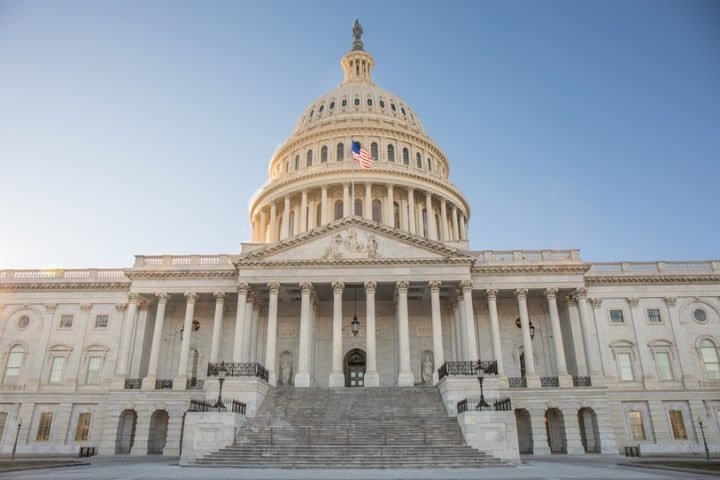
The House of Representatives passed the Separation of Powers Restoration Act legislation, known as SOPRA, (H.R. 288) on Thursday. The bill, if it becomes law, will end unconstitutional administrative law practices by shifting federal regulatory authority away from the executive branch back to Congress.
The legislation was introduced by Congressman Scott Fitzgerald (R-Wis.) and passed in a divided House by a 220–211 vote. According to an analysis and cost estimate by the Congressional Budget Office (CBO), the bill “would authorize federal courts that review agency actions to decide all relevant questions of law, including the interpretation of constitutional and statutory provisions and rules, without deferring to previous legal determinations by the agency.”
The CBO analysis continued, “Under the bill, federal courts could overturn some agency decisions that they would have upheld under current law. Some of those decisions could affect federal spending by overturning regulations that affect direct spending, revenues, and spending subject to appropriation.”
Fitzgerald shared the background on the bill in a press release, writing, “In 1984, the Supreme Court ruled in Chevron v. Natural Resources Defense Council that courts must defer to agency interpretations of ambiguous [statutes] rather than how Congress wrote them. This has led to executive branch agencies circumventing Congress to issue rules with the force of law. The Separation of Powers Restoration Act repeals that precedent, restores congressional intent, and stops executive branch overreach.”
“Government works best when it can be held accountable,” he continued. “Unfortunately, unelected bureaucrats in our agencies wield far more power than intended because of mandated deference, like Chevron, during judicial review. This legislation restores Congress’s authority as the branch that makes the laws and the judiciary as the branch to interpret and enforce them.”
SOPRA would nullify the 1984 Chevron ruling, which has led to out-of-control growth of regulations and power given to unelected bureaucrats in the labyrinth of federal agencies overseeing and impacting Americans’ daily lives.
According to The Epoch Times:
[Fitzgerald] said vast amounts of regulatory action have created unforeseen costs for ordinary Americans since the 1984 landmark ruling.
“The total annual cost of regulation is almost $2 trillion, or about 8 percent of the U.S. GDP,” he said. “If it were a country, for comparison, U.S. regulation would be the world’s eighth largest economy.”
Pointing out the massive growth of administrative law in the federal government, Congresswoman Harriet Hageman (R-Wyo.) said on the House floor, “Over the last few decades, and as accelerated during the Obama and Biden administrations, our constitutional separation of powers has been undermined by Congress’s over-delegation of legislative powers to regulatory agencies in the executive branch.”
As expected, the White House Office of Management and Budget released a statement in opposition to SOPRA, writing:
This bill would undermine separation of powers, a fundamental element of our government, by attempting to jettison longstanding principles concerning judicial review of agency interpretation and implementation of laws and regulations…. Agency interpretations that have been upheld under these principles have promoted economic growth, clean air and water, safe and healthy food, civil rights, public safety, crime reduction, wage increases, lowering costs, and safe working conditions.
It added that SOPRA would displace “the role that agencies supervised by the President play in implementing the statutory and regulatory provisions Congress has charged them with administering,” and that it “would undermine not only separation of powers, but also political accountability, national uniformity, and predictability.”
According to the Times:
Rep. Jerry Nadler (D-N.Y.), the ranking Democratic member of the House Judiciary Committee, said on the floor that the measure would “completely upend the administrative process” because it would force all federal courts to review agency decisions and “interpretations of statute on a de novo basis.”
“While Congress sets broad policies, we delegate authorities to executive agencies because we do not have the expertise to craft the technical regulations ourselves, and we rely on these agencies to carry out the policies we enact,” Nadler said.
The passage of SOPRA by the House is a public admission that Republicans who voted for the measure recognize that unwarranted growth of administrative law in federal government needs to end. However, the bill will most likely die in the Democrat-controlled Senate, and if it were to be passed by Congress, is facing certain veto by the president.




